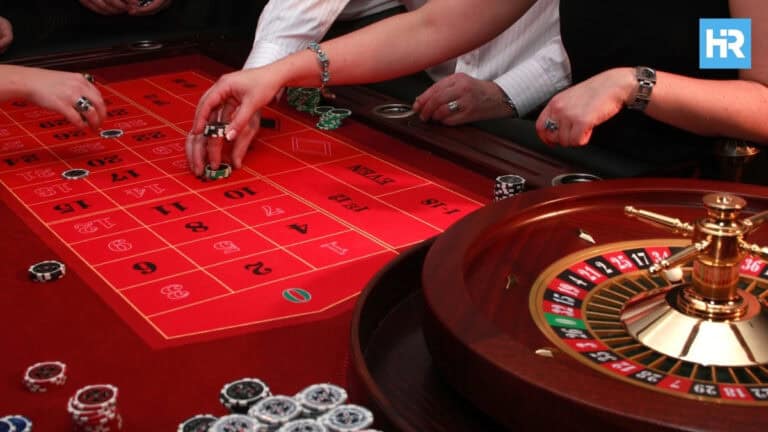
Not long ago, online gambling was mostly a solitary activity: one player, one screen, one silent spin. But in the evolving world of NJ iGaming, that model is quickly becoming outdated. New Jersey isn’t just driving record-breaking revenue, it’s quietly reshaping the digital gambling experience through something unexpected: social connection.
Today’s top platforms are folding social casino features directly into the core of their design. We’re talking about live tournament chatrooms, shared leaderboards, and peer-to-peer poker games that feel more like group hangouts than isolated bets. These aren’t side perks, they’re becoming the main attraction.
This shift signals more than just better UX. It points to a deeper cultural change: players want to engage, connect, and compete in spaces that feel lively, not lonely. As the social casino model takes hold, New Jersey is setting the pace, and offering a glimpse of where the future of online gambling might be headed.
What are Social Casinos, Exactly?
They’re not quite casinos. Not in the traditional, chips-on-felt, cigarette-in-hand sense. But social casinos have mastered the illusion, offering the same flashing lights, spinning reels, and blackjack tables you’d find in Atlantic City. The catch? You’re not betting dollars. You’re playing with virtual coins or sweepstakes tokens. Some are handed out freely each day. Others… well, they cost you, just not in the way casinos usually do.
On the surface, it sounds harmless. A free-to-play casino where nobody’s losing rent money. But these platforms don’t survive on simplicity. They thrive on engagement. And that’s where gamification in iGaming takes over. Every spin comes with XP. Every challenge completed unlocks a new tier. Players climb leaderboards, rack up achievements, and earn streak bonuses. It’s gambling, sure, but dressed up in the mechanics of mobile games we’ve been conditioned to love.
But here’s where things get really sticky, in a good way, and sometimes not. Social casinos are deeply social. They’re built around community gaming features: chatrooms buzzing during live tournaments, team-based leaderboards, and even digital “clubs” where players join forces. You’re not alone in front of a screen, you’re in a crowd. Even if you’re still in your sweatpants at 2 a.m.
That sense of belonging is part of the magic. But it’s also part of the risk. These games are sticky not just because they’re fun—but because they’re relational. You come back for the rush, sure—but you also come back for your people. And with real-money purchases always just a tap away, some critics say social casinos blur the line between harmless play and the habits that land people in trouble.
Still, for many across New Jersey and beyond, social casinos hit the right balance. No high-stakes pressure, no wallet drain, just a moment of escape. Log in, chat a little, spin a little, win something virtual and feel something real. And maybe that’s the future of iGaming: not colder, not riskier, but a little more human.
NJ iGaming Hits Record Highs: with a Social Twist
There’s a new kind of energy pulsing through the world of New Jersey online gambling, and it’s not just about the money. Yes, the figures are wild. But underneath the surface is a deeper story about how digital casino culture is evolving, blending entertainment, technology, and community in ways that feel more like Twitch than traditional slots.
If you thought this was just about placing bets, think again. What’s happening across online casinos in New Jersey is reshaping how people play, and why they keep coming back.
The Revenue Speaks, But So Does the Behavior
Let’s start with the numbers. In May 2025, New Jersey pulled in a record $246.8 million from internet gaming, up 28.5% from the same month last year. That surge pushed total gaming revenue statewide to $614.7 million.
Zoom out, and the bigger picture is even more telling: $2.39 billion in iGaming revenue throughout 2024, up 24.1%, according to the American Gaming Association. The takeaway? This isn’t just growth—it’s acceleration, fueled not only by gambling veterans but by newcomers pulled in by a wave of online casino trends NJ had barely seen just two years ago.
It’s Social Now: And That Changes Everything
What used to be a solo hobby has turned communal. Players aren’t just spinning reels, they’re joining tournaments, chatting live with dealers, and climbing leaderboards with friends. This surge in community gaming features has helped turn digital casinos into a sort of entertainment hybrid: part-game, part-social network.
Popular platforms are leaning into this space, even without real-money betting. Meanwhile, real-money platforms are embedding features borrowed from mobile gaming and social apps to create a stickier, more dynamic experience. It’s not just playing, it’s participating.
Mobile-First, Friction-Free, and Always On
Much of the success of online casinos in New Jersey can be traced to their design evolution. Today’s apps are fast, intuitive, and built for swiping, not clicking. Session lengths are rising, particularly among younger users, thanks to mobile-optimized games that blend entertainment with seamless micro-interactions.
The mobile shift isn’t just about convenience. It’s about immersion. Whether you’re at the train station or in bed, the casino is now in your pocket, and it talks like your favorite game app, not like a cold, corporate platform. That approachability is winning over new audiences fast.
Social = Strategy, Not Just Style
Underneath all this flash is a hard business truth: gamification in iGaming works. Leaderboards aren’t just fun, they increase time-on-site. Chatrooms create emotional attachment. Multiplayer games foster loyalty. In short, the more social it feels, the longer players stay, and the more likely they are to return.
Operators know this, and it’s changing how they build. Across the board, from small sweepstakes sites to the biggest online casinos New Jersey has to offer, the trend is clear: social isn’t a gimmick. It’s the strategy.
Social Features at the Center of the Strategy
You can have the slickest slots and the biggest bonuses, but if your platform feels empty, players won’t stick around. That’s the shift happening right now in New Jersey online casinos: social features have gone from “nice to have” to “non-negotiable.” We’re no longer in the era of silent reels and isolated bets. Players want energy. They want people. They want to feel like they’re part of something, even if that something exists entirely online.
The rise of virtual casino communities is less about technology and more about psychology. Because at the end of the day, the game matters, but the connection matters more.
From Solo Play to Shared Rooms
One of the clearest signs of change is the explosion of casino chat features. Whether it’s real-time conversations with other players during blackjack rounds or light banter in slot tournaments, the silence that once defined online gambling is being replaced with dialogue. Platforms now stream multi-angle HD tables where players interact, react, and even cheer each other on in the chat.
This isn’t just a gimmick, it’s a new kind of iGaming social interaction. One that turns gameplay into a digital hangout, and tables into touchpoints.
Competitive Spirit Meets Social Glue
Tournaments, leaderboards, and peer-to-peer poker challenges are no longer fringe experiences, they’re front and center. These features tap into a natural sense of competition but with a friendly, community-first twist. You’re not just trying to beat the house; you’re trying to beat someone with a screen name you recognize from last week.
This element of shared rivalry builds stickiness. It transforms a casual session into a meaningful one. You’re not playing to pass time: you’re playing to show up.
AI That Feels Like a Host, Not a Sales Pitch
Personalization is becoming a silent engine of retention. Today’s top platforms use AI to learn what you like, when you play, and what you’re likely to enjoy next. But it’s not just about showing you the most lucrative slot, it’s about surfacing the experience that feels right for you.
The result? A more tailored lobby. Timely tournament nudges. A gentle reminder that your friends are already playing. It feels less like marketing and more like a casino host who actually knows your name.
Designed to Be Social by Default
Finally, there’s the architecture itself. Modern iGaming platforms—especially in NJ—are built around mobile-first design where iGaming social interaction is not buried in the sidebar; it’s the main event. Chatrooms, invites, shareable wins, and community tabs are central to the layout.
This is what separates the old guard from the new wave. The best platforms today don’t just enable interaction, they actively encourage it. Because when you build a product that people come to for connection, they’ll keep coming back for everything else too.
Legislative Recognition and Regulatory Framework
For a while, social casinos danced just outside the reach of regulators, operating in that curious space between gaming and gambling. But in 2025, that dance started to slow. New Jersey, long a leader in digital gambling policy, made its next bold move: treating social features not as novelties, but as real components of the iGaming experience, worthy of rules, oversight, and clear boundaries.
This isn’t just about slot animations and leaderboard chats. It’s about defining what gambling is in an age where money isn’t always the currency.
The Nation’s First Bill Targeting Social Casinos
On January 16, 2025, Assemblyman Clinton Calabrese introduced Bill A5196, a quiet but groundbreaking moment in NJ gambling legislation. Referred to the Tourism, Gaming and the Arts Committee, the bill is the first in the U.S. to directly address internet casino sweepstakes operators, specifically those that simulate gambling using virtual currency and social mechanics.
It draws a line in clear legal terms. Any platform offering an experience “equivalent to, or with similar statistical odds of winning as an authorized gambling game,” even without requiring an initial monetary deposit, falls under its scope. In other words: free-to-play doesn’t necessarily mean free from regulation.
A New Chapter for Social iGaming
What’s remarkable isn’t just the legal language, it’s the underlying shift in how lawmakers are thinking. Social casino mechanics—chatrooms, virtual coins, tournaments—were once seen as lighthearted add-ons. Now, they’re part of the regulatory conversation.
This bill could become a model. As social casinos continue to blur the lines between entertainment and gambling, NJ gambling legislation is carving out a blueprint for how other states might respond. And for operators, it signals a need to rethink game design, not just to maximize engagement, but to ensure compliance in a market that’s finally watching more closely.
Responsible Gaming in a Social World
The more interactive iGaming becomes, the more responsibility it demands. Social casinos—once considered harmless digital diversions—now rival traditional platforms in terms of time spent, emotional investment, and yes, real-world consequences. That’s why New Jersey isn’t just watching the space grow, it’s tightening the rules around it.
In 2025, the conversation around responsible gaming in the Garden State shifted from optional to urgent.
From Concern to Coordination
Recognizing the evolving risk landscape, New Jersey established the Responsible Gaming Task Force in 2024. The goal? To unify what had previously been a fragmented approach. Among its top recommendations: the creation of a centralized oversight body—URGE (Unifying Responsible Gaming Efforts)—to align policy, enforcement, and communication across agencies and platforms.
For the first time, social and real-money gaming are being treated with equal seriousness in regulatory frameworks.
Setting Limits Before Things Spiral
Forget the old model of waiting until someone hits rock bottom. Today, platforms are required—by the Division of Gaming Enforcement (DGE)—to implement proactive tools: deposit limits, session time tracking, and cool-off periods. These aren’t just for high rollers. They now extend to social casino players as well, signaling a clear message: free-to-play doesn’t mean free from risk.
For users, these features are easy to overlook. But for regulators, they’re becoming the baseline, especially as engagement deepens through chatrooms, tournaments, and mobile-first play.
Educating Before Intervention
The task force’s focus isn’t just on regulation, it’s on prevention. That includes public education campaigns, outreach in schools and universities, and updated messaging strategies that speak to modern user behavior. Think: mobile banners that nudge players to take breaks, or targeted alerts when usage patterns spike.
It’s a shift from moralizing to modernizing, speaking in the tone of the platforms people actually use, not the language of pamphlets no one reads.
Watching the Most Vulnerable
Certain groups are more at risk in this hybrid landscape of entertainment and gambling. The task force identified key demographics: young adults, low-income users, and people with prior addictive behaviors. These groups aren’t necessarily overrepresented on social platforms, but when they do engage, their patterns are different.
New Jersey now requires operators to track engagement across these segments and report anonymized behavioral trends, part of a broader push to make data-informed decisions that can actually prevent harm before it starts.
Community: More than a Feature: It’s a Differentiator
In a digital casino world where everyone has the same flashy slots and welcome bonuses, the real winners are the platforms that understand one simple truth: people come for the games, but they stay for the community. In New Jersey’s iGaming scene, that community is no longer an afterthought, it’s become the defining edge.
Operators aren’t just building casinos anymore. They’re building places to gather, chat, share, and compete, even if you’re miles apart and playing from your phone.
It’s Not Just a Spin: It’s a Shared Moment
Take social slots NJ, for example. These aren’t just solo spins anymore. You’ll often find slot tournaments with live leaderboards and chat enabled, where players race for top prizes while commenting in real time. A big win isn’t just satisfying, it becomes a moment shared with dozens of strangers-turned-rivals-turned-teammates.
According to a 2025 GlobeNewswire survey, 68% of players say that both privacy and social interaction are critical to their enjoyment. That’s why casino chat features, anonymous avatars, and shared chatrooms aren’t just fluff, they’re emotional infrastructure.
Gifting, Hosting, and the Poker Table Next Door
Social features are evolving beyond the screen. You can now send a friend spins or chips, invite them to a match, or join a private room for poker. These mechanics, once relegated to mobile games, are reshaping how people play in real-money and social casinos alike.
Even live casino games NJ—think blackjack or roulette with HD-streamed dealers—are now layered with chatrooms and friend-based features. The result? A hybrid between a home poker night and a professional casino, without ever leaving your couch.
AI That Knows When to Say “Hi”
Behind all this interaction is an AI quietly pulling the strings, but not in the creepy way. Personalized chat nudges, timely bonus offers, and “hey, your friend is online” prompts are now standard across the top platforms. It’s less about automation and more about orchestration, using data to make social gaming feel intuitive and timely.
The American Gaming Association noted in its 2025 report that AI personalization isn’t just improving player experience, it’s extending session times, boosting return visits, and most importantly, fostering stronger community ties between players and the platforms they choose to trust.
The Psychology Behind Social Play
Social casinos don’t just entertain, they’re engineered to keep you coming back. At first glance, it’s easy to attribute their success to good design, flashy animations, or the novelty of earning coins instead of cash. But dig deeper, and what you find is something more complex, and far more intentional.
From behavioral loops to emotional triggers, social casino platforms tap into the same psychological mechanisms that make video games addictive, slot machines captivating, and social media platforms hard to quit. It’s not random. It’s psychology-driven design, built to feel fun, without always feeling like a gamble.
The Dopamine Loop: Why Rewards Keep Us Hooked
Every spin, badge, and unlocked feature in a social casino delivers a small hit of dopamine. This isn’t metaphor—it’s neurochemistry. According to a study by the American Psychological Association, variable-ratio reinforcement schedules—the same used in traditional slot machines, are among the most powerful motivators of repeated behavior. You don’t know when the “win” is coming, so your brain stays alert, engaged, and eager.
In social casinos, this loop is amplified through gamified mechanics: leveling up, earning bonus spins, unlocking new avatars. The unpredictability of reward creates a tension that’s exciting, sometimes euphoric. And it’s this tension that keeps users spinning, even when no real money is on the line.
Social Validation and Streaks: A Recipe for Retention
There’s another ingredient: being seen. Many social casinos now display leaderboards, player rankings, and public win notifications. It’s not just about your own progress, it’s about how others see you progressing. And that matters more than we like to admit.
In a 2023 study by the Journal of Behavioral Addictions, researchers found that public recognition—combined with “streak” features—can significantly increase daily log-ins and session length. If you miss a day, you lose momentum. If you win in front of a chatroom, you gain status. These elements trigger FOMO and social reinforcement, encouraging players to return, not just for the game, but for the acknowledgment it brings.
Are Social Casinos the New “Digital Third Place”?
Sociologist Ray Oldenburg once coined the idea of the “third place”, not home, not work, but a social environment where people unwind and connect. In 2025, that third place might just be a multiplayer poker room on your phone. Social casinos offer community, routine, and low-stakes interaction, especially for users seeking connection without real-world risk.
With chatrooms, gifting systems, private clubs, and repeat log-in incentives, many of these platforms are designed to feel less like apps and more like spaces. Places where you recognize usernames. Where you return to familiar tables. Where the real draw is who’s playing, not just what’s playing.
Where the Future Feels Familiar
As New Jersey redefines the online gambling experience, one thing is clear: the future of iGaming doesn’t feel like a casino, it feels like a conversation. Social casinos have blurred the line between gameplay and gathering, between betting and belonging. What once felt isolating now feels oddly familiar, like logging into a digital lounge you return to every night.
But this isn’t just innovation for innovation’s sake. It’s a shift with real implications: for regulation, for responsible gaming, and for how we understand digital leisure. If New Jersey is the blueprint, the next wave of online gambling won’t be about chasing jackpots, it’ll be about chasing connection.
The house still wins. But now, it also listens, learns, chats, gifts, and remembers your name. And maybe, just maybe, that makes it a little more human. And a little harder to leave.









